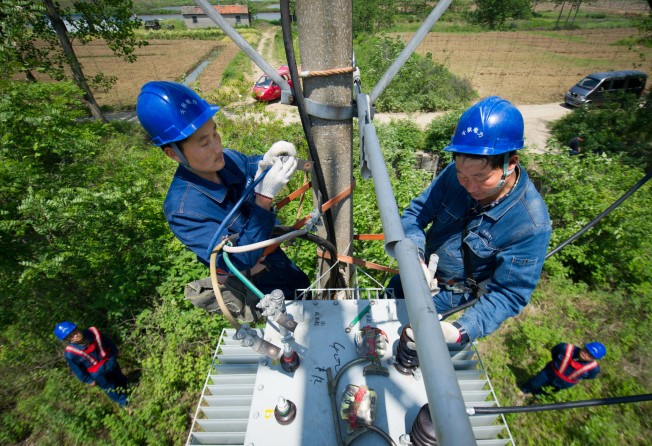State Grid to invite private capital to build electric-car charging stations
Investment sought for electric vehicle charging stations as mainland opens up utilities sector

The mainland's dominant power grid operator, State Grid Corp of China, will invite private capital to build electric vehicle charging stations and integrate more power from private producers into the state grid, marking a step forward to the opening up of the utilities segment amid state-owned sector reform.
State Grid said yesterday that it would support charging services for all kinds of electric vehicles, allowing consumers to build their own charging stations if they had a fixed parking space, Xinhua reported. The charging cost could be as low as 50 fen per kilowatt-hour, which would be more cost-effective for consumers, it said.
State Grid said it would also support the development of distributed energy resources, which are privately owned, smaller-scale power sources, usually located close to where electricity is used.
Individuals who had solar power panels at home would also be allowed to integrate the electricity into the state grid, Xinhua said.
It marked a step forward in the opening up of the mainland's utilities sector to private investment, said Zhu Boshan, the general manager of Tacter Investment Consulting in Shanghai.
"Allowing private capital in charging stations means the opening up of the electricity distribution side, while supporting smaller-scale power units to integrate into the state grid will allow more private units to participate in power supply," said Zhu, who focuses on state-owned enterprises reform.
"This is in line with the government's stance to break state-owned monopolies."
Zhao Xijun, a finance professor at Renmin University in Beijing, said the government had been gradually allowing more private investment in monopolised industries, but the opening up of utilities would remain limited because of public interest concerns.
Utilities industries such as the electricity sector were closely related to people's livelihoods, so the government would only partially open them up to the private sector, he said.
Beijing has said SOEs with monopolistic market positions should co-invest with private firms in an effort to boost business efficiency, following a key Communist Party meeting in November last year that called for market forces to have a decisive role in the economy.
Despite the government's efforts to promote the use of electric vehicles and curb pollution, one of the obstacles has been a lack of charging stations.
Zhu said that although more private investment would be welcome in the building of smaller power generators and electric car charging stations, the business might not be lucrative enough to attract private firms.
Electricity prices were controlled by the government, which would make it more difficult for private power units to make a profit, he added.